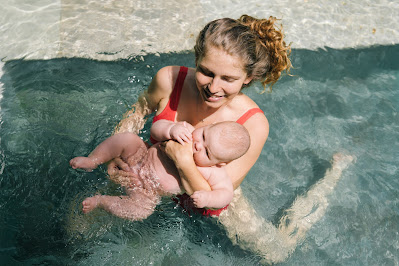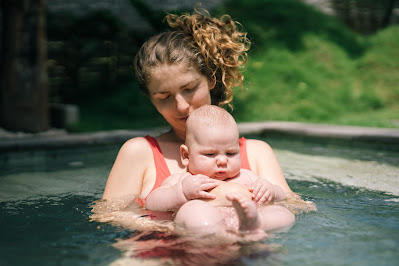Can newborn babies swim? The answer might surprise You!
Can newborn babies swim?
One of the best ways to do that is by taking them swimming!
Not only will they love it, but they’ll also be more likely to enjoy being in
the water whenever they get older, which means that baby swim lessons are the
perfect gift to give your little one right now. Here are some things you should
know about getting those newborn baby swim lessons done!
Are you looking for the perfect way to bond with your little
one? How about newborn baby swim lessons? Many parents are surprised at how
quickly their little ones pick up the basics of swimming when they take this
type of class, and it’s also a great exercise for both you and your little one.
Whether you have a new baby or toddler who’s getting close
to being ready to learn how to swim, or you’re just curious if taking newborn
baby swim lessons is right for your family, read on to find out everything you
need to know about this great new way to interact with your child in the water!
Here are some tips on how can newborn baby swim and what you
can do before the big day to ensure your baby’s safety!
How swimming can help newborns?
Breastfeeding is extremely important for newborn babies; it’s
encouraged that mothers continue breastfeeding through their child’s first year
of life. Breast milk contains nutrients that are critical for a baby’s
development, but there are many other benefits of breastfeeding as well.
Swimming with a baby is a great way to help them while they
enjoy and soak up some of these benefits! Babies have been enjoying water since
birth, however, most babies aren’t introduced to formal swimming lessons until
they’re much older.
If you have an infant at home who has yet to experience
swimming, consider taking him or her out on a trip to a local pool or aquatic center—the
earlier babies start learning how to swim, the better!
How to make sure you have time for swimming lessons
Newborn baby swimming lessons are a fun, easy, and effective
way for parents and children to bond. However, it is not always easy for
parents and their babies to find time in their busy schedules for swimming.
This can lead to many families missing out on an important bonding experience.
To make sure you have time for these newborn baby swim
lessons, start by scheduling them into your day or week immediately after birth
when both you and your baby will be at your most energetic levels. Also,
consider doing some research before making any final decisions about where to
take your newborn baby swimming.
Most places offer a free trial period so that you can try it before you buy. If possible, schedule your newborn baby swim lesson right after work so that neither of you has to rush home first. Finally, if possible don’t forget to bring along someone else who can watch over your other children while you enjoy some quality time with just your newborn baby.
can newborn babies swim?
It might be hard to believe, but babies are born knowing how
to swim. Their bodies naturally float and they instinctively look for support
from a source outside themselves. In their first year of life, it is possible
(and even recommended) that babies spend some time in a pool or at least under
running water.
Practical tips for babies swimming
In addition to being a fun activity, swimming is an ideal activity for parents and their newborns. If you’re keen on taking your baby swimming, but aren’t sure how, or if you’re worried about safety issues surrounding infants in water; here are some tips on making it a positive experience for everyone involved.
First off, never leave your baby unattended in water – always be within arm’s reach of them at all times. For example, when getting into or out of a pool; use extra caution by having someone hold onto them as you do so.
When going into deeper waters (such as ocean waves), make sure that there are lifeguards nearby who can quickly rescue them should they get into trouble.
Health benefits of newborn swimming lessons
Swimming is a fantastic skill for infants and toddlers to learn. Not only will they have fun, but swimming can also be beneficial in many ways. Swimming can help improve balance, coordination, and spatial awareness as well as promote muscle tone and strengthen bones. Moreover, not only is it fun, but it can also help develop motor skills and teach the baby important safety skills like holding his breath underwater.
The physical development swimming provides will set your child up for future success in many aspects of life—not just in sports. Plus, swimming gives babies a sense of confidence and independence before they’ve even taken their first steps or said their first words. And you get to spend quality time together while having fun! It doesn’t get much better than that.
FAQs
What do you need to know about newborn swimming lessons?
The American Academy of Pediatrics (AAP) recommends that
babies receive submerged bath time until they reach 6 months old—which means
it’s safe to introduce your newborn to a baby pool around 4 months old. After
that, try teaching him basic floating and kicking techniques as soon as he
shows interest in toys in his bathtub or shower.
If he seems interested in splashing around, let him do so—just make sure he always has someone nearby who can keep an eye on him. If your baby has reached 6 months old without any formal swimming instruction, don’t worry; most kids won’t start learning how to swim until they’re between 1 and 2 years old.
How to know if it's too cold outside?
Many parents don’t want their babies to get cold when
they’re out in public, but how do you know if it’s actually too cold? The best
thing you can do is get your hands on a good thermometer. It will quickly
become obvious what an appropriate temperature for an outside day is for a
newborn.
If it’s consistently above 70 degrees and all other
conditions are good, no need to worry. But be sure to use common sense: if it’s
windy or there’s rain or snow, cover up your baby well and make sure he stays
dry.
And remember that air conditioning can also be dangerous—be
careful not to let your child get too hot indoors. Babies have very thin skin,
so extreme temperatures can lead to hypothermia or heat stroke (or worse).
Always err on the side of caution—you know your child better than anyone else
does!
How swimming will help your baby learn?
Babies are naturally drawn to water, and they’re fascinated
by all its properties. Swimming not only gives them a safe environment in which
to play, but it also provides essential exercise that aids muscle development
and boosts confidence.
It’s never too early for children to learn how to be
independent swimmers. In fact, starting as early as six months will ensure a
lifetime of water fun for both you and your child. The key is to start when
babies are most receptive: newborns can even begin taking swimming lessons at
birth if their parents want.
The best part? Your little one won’t even know she’s
learning; babies absorb information easily through repetition, so swimming with
her parents will quickly become a routine activity she looks forward to each day.
Even better? Swimming is an ideal opportunity for bonding between parents and kids—and it h and healthy habit from an early age.
Conclusion
We all know that babies are adorable. If you’re a new
parent, you probably think they’re pretty clever, too. But did you know that
your newborn baby is also capable of learning how to swim? While swimming isn’t
a skill usually associated with young children, it is possible for them to pick
up. Don’t believe us?
Start early – Babies develop at different rates, but as soon
as you feel your child is ready (typically around 4-6 months), consider
enrolling him or her in an infant swimming class. It’s never too early to start
teaching your child water safety and introducing him or her to activities like
splashing and blowing bubbles—skills that will help make sure he or she enjoys
an active lifestyle from day one!
Keep reading for some insightful tips for Children's Care.








.jpg)
Leave a Comment